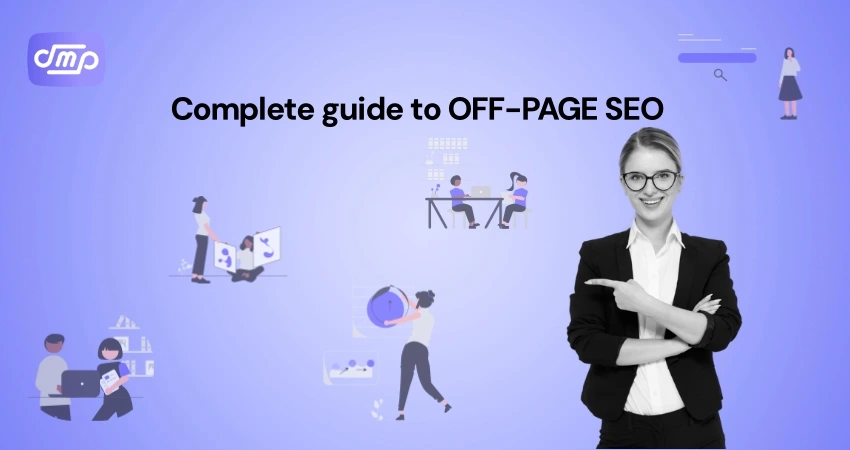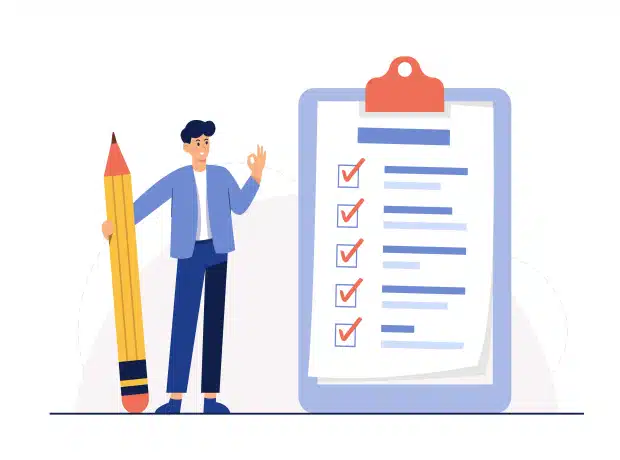
- August 4, 2023
- Digital Marketing
- Search Engine Optimisation (SEO)
What is off-page SEO?
The term “off-page SEO” refers to a variety of optimization strategies applied outside of a website to raise its visibility and search engine rankings. Guide to Off-page SEO is concerned with establishing a website’s reputation and authority through link building, social media marketing, content marketing, and other strategies as opposed to on-page SEO, which focuses on optimizing items on a website.
Typical off-page SEO strategies

- Link building is the process of getting high-quality backlinks to your site from other respectable websites, which can help your site become more authoritative and visible.
- Social media marketing is the practice of promoting your website on websites like Facebook, Twitter, and LinkedIn in order to increase traffic and enhance your online reputation.
- Content marketing is the process of producing top-notch content that other websites will link to in order to increase the authority and visibility of your website.
- Monitoring and controlling your internet reputation is essential if you want search engines and potential customers to see your brand favourably.
- Each thorough SEO strategy must include a detailed guide on off-page SEO because it can raise your website’s visibility, boost its search engine rankings, and increase traffic to it.
Guide to Off-Page SEO
Guide to Off-page SEO is crucial for developing a solid online presence, raising your website’s search engine rating, and bringing in more visitors and leads.
- Enhances website rankings in search engines: Search engines like Google take into account the quantity and quality of backlinks to a website when calculating its rating. Building high-quality backlinks through off-page SEO can help your website rank better in search engine results (SERPs).
- Builds authority and reputation for a brand: Building a solid brand reputation and authority is made easier by using off-page SEO strategies like social media marketing, content marketing, and online reputation management. This can boost the reputation and reliability of your website, resulting in an increase in conversions and revenue.
- Boosts website traffic: Adding backlinks to your site and advertising it on social media sites helps increase website traffic. This might aid in increasing the traffic to your website and its visibility.
- Expands your audience: By marketing your website through a variety of online platforms, you can connect with more people, including potential clients who may not have previously heard of your company.
Off-page SEO ranking factors
The measures conducted outside of your own website to increase its standing on search engine results pages are referred to as “off-page SEO ranking factors” (SERPs). Some of the most significant off-page SEO ranking criteria are listed below:
Backlinks: One of the most significant guide to off-page SEO variables is the quantity and calibre of backlinks pointing to your website. Your website will rank better on search engine results pages (SERPs) the more high-quality, relevant backlinks it has. Your website’s credibility and trustworthiness are communicated to search engines by backlinks from high-quality, authoritative websites, and this can increase your website’s positioning on search engine results pages (SERPs).
Backlinks from other websites can increase traffic to your website and expose it to more potential clients. Backlinks from websites that are pertinent to your company and sector are more likely to bring in higher-quality visitors, which in turn leads to higher conversion rates. It helps to establish a solid backlink profile to your company compared to the rival companies of the same sector.
Social media: Social media engagement, including shares, likes, and followers, might affect how well-received your website is. Search engines can use social media signals to judge how popular and relevant your website is. Social media includes factors such as setting up profiles, posting updates frequently, interacting with followers and provisioning relevant stuff. To enhance visibility and increase traffic to your website, share your blog posts, articles, and other information on social networking sites.
The reach of your material can be increased by using hashtags and keywords. You can employ social media to establish connections with industry influencers and other websites. It also gives a chance for guest posting and other link-building techniques. By creating and optimising your business profiles on regional social media sites like Facebook, you may increase your local SEO.
Internet directories: Getting backlinks to a website via internet directories used to be a common strategy for improving off-page optimisation. Although some low-quality directories may potentially hurt a website’s ranking, the efficacy of directories has diminished since Google’s algorithm adjustments. Yet, a few high-quality directories can still be useful for off-page optimisation.
It’s crucial to remember that directories have limited value, and thus it’s preferable to concentrate on producing excellent content that naturally draws backlinks rather than relying on directory submissions. Avoiding spamming directories or employing black hat methods to manipulate rankings is also essential because doing so can result in penalties from search engines. Creating excellent guest posts for other websites can help you increase the number of backlinks pointing to your website and establish your authority in your area.
Outreach to influencers: Working with influential people in your field can expand your audience and create high-quality backlinks for your website. Locate influential people in your niche who have a sizable fan base and active followers. Discover their audience and the types of material they post by researching their content after you’ve discovered potential influencers.
You may use this to better match their interests to your outreach message and proposal. Use social media or email to get in touch with influencers and introduce your brand. Describe why you believe their audience should care. Influencers are frequently more inclined to share your content if there is a benefit for them. This may take the form of a sale on your goods or services, a promotion on your social media pages, or a guest blog post on your website.
Concentrate on producing good content for your target audience, and traffic and backlinks will come organically. Your website’s ranking may be impacted by the amount of time users spend on it, the number of pages they view, and their bounce rate.
Local SEO: Strategies for local search engine optimisation, such as registering your business with Google My Business and adding your website to local directories, can increase the visibility of your website in local search results. Request feedback from your clients on Google My Business and other review websites. Good evaluations might increase your local search visibility and draw in additional clients.
Get backlinks from other local businesses and organisations by developing relationships with them and asking for links to their websites. This might increase the visibility of your website in local searches and increase visitors. Include local keywords in the page names, meta descriptions, and headings of your website. Your local search rankings for pertinent search phrases may be enhanced as a result. Be persistent and patient in your efforts because local SEO takes time and work to produce results. Put your attention on giving your clients value and cultivating connections with other neighbourhood businesses.
Off-page SEO checklist

Here is a list of off-page SEO strategies you can employ to raise the rating of your website:
- Concentrate on constructing high-quality backlinks from reliable websites in your specialised field. When looking for prospective link-building possibilities, use tools like Ahrefs or Moz.
- To raise brand awareness and enhance website traffic, share your content on social media platforms and interact with your audience.
- To create backlinks and improve the visibility of your company, write excellent guest posts for reputable websites in your area.
- To raise your website’s local search engine rankings, submit it to pertinent online directories and citation sources.
- Work with influential people in your sector to expand your audience and create high-quality backlinks to your website.
- Track brand mentions with tools like Google Alerts or Mention, then react appropriately.
- Track your success over time by keeping an eye on your website’s analytics to find areas that could use improvement.
- By registering your business with Google My Business, adding your website to local directories, and establishing local citations, you can optimise your website for local search.
- Provide excellent, compelling content that motivates visitors to stay on your website longer and recommend it to others.
- Constantly assess the results of your off-page SEO work and modify your plan as necessary to raise the ranking of your website over time.
What are the different types of backlink submissions?
To increase the rating of your website, backlinks can be sent in a variety of ways, such as:
- Composing and sending top-notch guest posts with a backlink to your website to other specialised websites that are relevant to you.
- Submitting pertinent remarks with a link to your website on forums and discussion boards.
- Adding insightful, pertinent comments to blog entries that are linked to your website.
- Adding your website or blog post to social bookmarking sites like Reddit, Digg, and Stumble Upon is known as social bookmarking.
- Adding your website to appropriate online directories to increase its authority and visibility.
- Making and publishing infographics to websites that are relevant to your business with a link back to your website.
- Discovering broken links on other websites and offering to replace them with a link to your own is known as broken link building.
- Producing excellent, thorough material and disseminating it to other websites in your specialised field to gain backlinks.
- Link building for resource pages is finding pertinent resource pages on other websites and asking for a link to your website to be added.
- Although backlinks are crucial for raising your website’s ranking, it’s equally crucial to prioritise quality over quantity. Several relevant, high-quality backlinks are preferable to numerous low-quality or irrelevant ones.
Best Off-page SEO agency in India
While choosing an SEO agency in India, keep these factors in mind.
- Expertise: Search for a company with experience in your sector or area and a track record of success in off-page SEO.
- Reputation: Seek out an agency with glowing client comments and reviews.
- Transparency: Seek a firm that is open about the off-page SEO strategies it uses and that clearly explains its plans and outcomes.
- Customization: Seek out a company that provides off-page SEO solutions that are specifically catered to your company’s demands and objectives. Search for an agency that keeps you informed about the status of your off-page SEO campaign and is attentive to your requests.
- Cost-effectiveness: Search for a company that provides off-page SEO services that are affordable without sacrificing quality.
When choosing an agency, it is always a good idea to do some research and compare different ones. Asking other business owners or colleagues in your sector for recommendations is another option.
Conclusion
Guide Off-page SEO refers to the methods and tactics applied outside of a website to raise its visibility on search engines and other online directories. A website’s authority and relevance are better understood by search engines thanks to off-page optimisation. As a result, a website may rank better in search results and receive more organic traffic. Brand awareness and exposure can be raised via off-page SEO strategies including social media marketing, influencer outreach, and content marketing.
More website traffic, followers on social media, and ultimately more purchases, may result from this. Online reputation management is an off-page optimisation approach that can help improve a website’s online reputation. Increased reputation and trust among potential clients can result in greater sales in the long run. Off-page optimisation can significantly affect a website’s traffic, search engine positioning, and overall online visibility. Businesses can enhance their online presence and ultimately accomplish their online marketing objectives by putting into practice efficient off-page optimisation tactics.












